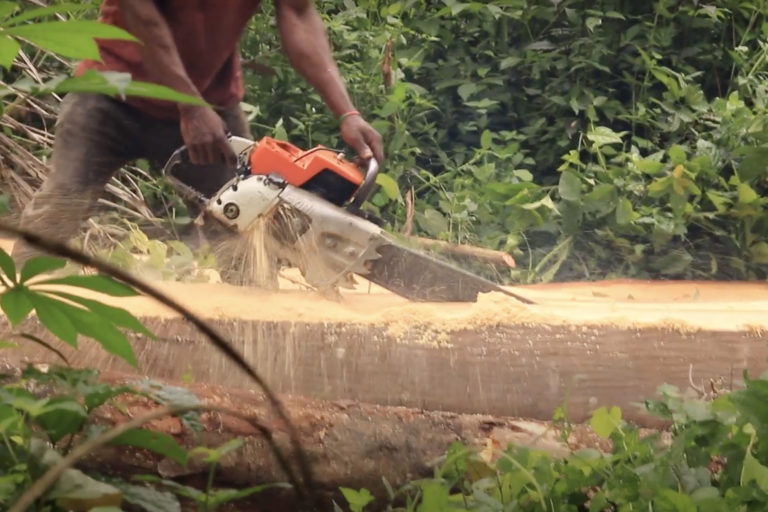
Timber companies in cameroon
- Cameroon expands limits on raw log exports, with a view to a total ban.
- Nigerian villagers step up to protect nearby forests from illegal logging.
- Forests & Finance is Mongabay’s bi-weekly bulletin of news from Africa’s forests.
Cameroon expands limits on raw log exports
YAOUNDE — Cameroon’s Ministry of Forestry and Wildlife (MINFOF) has expanded the list of tree species that can no longer be exported from the Central African country as raw logs. Along with other Congo Basin countries, Cameroon is moving toward a complete ban on exports of unprocessed timber, which is now expected to come into force in January 2026.
In 2018, the ministry banned raw log exports of 31 species. A June directive from MINFOF lists 45 additional species, including commercially-prized ones like moabi (Bailonella toxisperma) and okoume (Aucoumea klaineana), that will now have to be processed inside Cameroon before export to markets in the EU or Asia. The list will expand again in 2025, the ministry says, closing the door to raw log exports on all but seven timber types.

A complete ban on raw log exports, intended to stimulate the development of domestic timber processing and retain a greater share of the value of timber exports, was originally scheduled for January 2022. Cameroon and its neighbours have postponed adoption of the ban several times, saying their domestic timber sectors are not yet ready to process wood on the scale needed.
Andre Bekolo Nka, who heads MINFOF’s work in the Boumba and Ngoko division of Cameroon’s East region, told Mongabay that the main species currently exploited in the forest there include padouk (Pterocarpus soyauxii), used extensively for construction, and sapelli (Entandrophragma cylindricum), valued for its quality timber, as well as an edible caterpillar that feeds on it.
Nka told Mongabay that since the early 2000s, every company with a permit to harvest timber in his division also has a processing plant, and 70% of trees legally felled in Boumba and Ngoko are processed locally. He said 30% of the division’s timber is destined for export, including substantial amounts of trees only recently targeted here, such as the durable hardwood tali (Erythrophleum suaveolens) and ayous (Triplochiton scleroxylon). “With the imminent end to raw log exports, awareness is being raised, and sawn timber, in this case, ayous, is being piled up on site,” he said.
Nka said banning raw log exports needs to be accompanied by revised policy to encourage loggers to maximize processing of trees they cut down, recovering wood for local consumption that’s currently thrown away.
“The total ban on exporting logs should call for a paradigm shift in the management of our forests. We should no longer limit ourselves to harvesting logs alone but also recover the large branches that can be processed,” he told Mongabay.

Nigerian villagers step in to regulate nearby forests
Residents of Olom and Buanchor, two villages in the rainforests of Nigeria’s Cross River state, have passed local bylaws to protect the forests and biodiversity surrounding their homes from illegal logging.
“Today, those communities have zero tolerance for logging,” said Peter Oru-Bete, executive director of Biakwan Light Green Initiative (BLGI), an environmental group based in the state capital, Calabar.
Oru-Bete said community leaders and residents took an active role in designing the bylaws and a forest policing system, with support from BLGI. General assemblies in each community ratified the bylaws before registering them at the customary court and the local government council, making them legally binding on locals and outsiders alike.
He described illegal loggers in Cross River as “forest bandits” taking advantage of weak law enforcement to commit environmental crimes.
Oru-Bete told Mongabay that illegal logging in the state is sponsored by Chinese businesspeople based elsewhere, represented locally by middlemen, primarily from the northern part of the country, who pay locals to find and cut down valuable trees.
“The external people provide the finance and vehicles to facilitate the illegal logging,” he said.
The state forestry commission is formally responsible for forest management, but has largely failed in its responsibility due to lack of capacity and corrupt officials, according to Oru-Bete. He said illegal logging activities are often exacerbated by government agents together with faulty policies.
Alongside the development of local laws to regulate forest management, BLGI has also trained women and youth from Olom and Buanchor in raising nurseries of and planting indigenous trees, which provide alternative sources of income to logging.
“Community-based forest management actions allow for community people to add value to what they have and become willing to handle sustainability,” Oru-Bete said.
From cardamom to carbon: Bold new Tanzanian project is regrowing a rainforest
Abdulkareem Mojeed and Leocadia Bongben contributed to this bulletin.
FEEDBACK: Use this form to send a message to the author of this post. If you want to post a public comment, you can do that at the bottom of the page.

